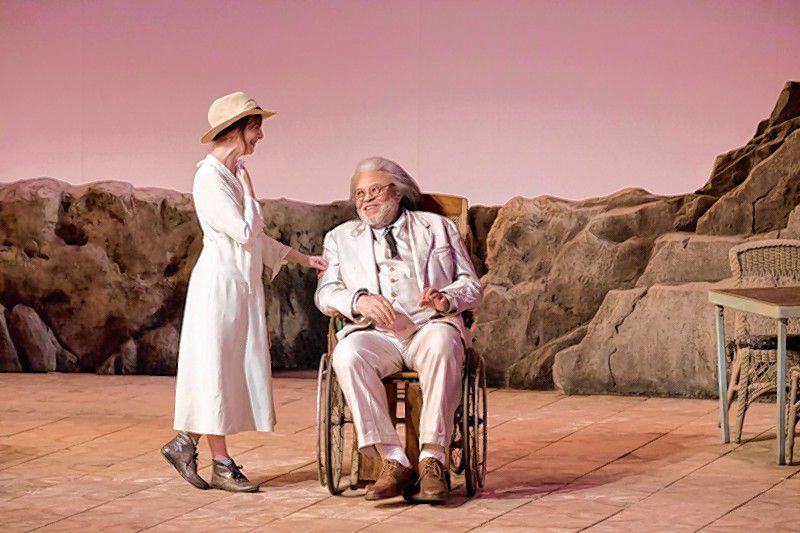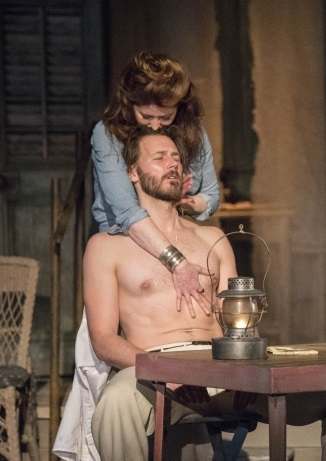Some of those leaving the American Repertory Theater’s current production must be surprised and baffled, not to mention disappointed. On my way out of the Cambridge theater on opening night, I overheard a man asking, “Why did James Earl Jones have such a small part?” I was asking the same question myself.
The show is Tennessee Williams’ steamy 1961 drama The Night of the Iguana. It’s directed by Michael Wilson, who led Hartford Stage for a dozen years, and features four more stars: Dana Delany, Amanda Plummer and two veterans of previous Wilson projects in Hartford, Elizabeth Ashley and Bill Heck.
In his dramaturg’s notes, Chris Baker calls Iguana “a threshold play, poised between the lyrical, cause-and- effect dramas that secured Williams’ reputation and the departures in form and substance that occupied his later plays.” Williams himself called it “more of a dramatic poem than a play,” and in fact nothing particularly dramatic happens until near the end.
The themes and location, as well as a quartet of extras, are based on a month Williams spent in a seedy Acapulco hotel overlooking the Pacific Ocean in 1940. At that time he was, as one of this play’s characters puts it, “at the end of his rope” — sick, depressed, suicidal — while being daily reminded of the Nazis’ ongoing rape of Europe by a noisy family of German tourists celebrating the Blitz. The misfits and exiles who inhabit this hotel, though, are sprung from his imagination.
 There’s Larry Shannon (Heck), a Virginia preacher driven from his congregation for statutory rape and blasphemy, who has fled the scene and now works as a down-market bus-tour guide. The hotel is his periodic sanctuary when “the spook” of alcohol and depression starts haunting him. This time, he’s also seeking escape from the busload of Baptist ladies he has been shepherding around Mexico. Exhausted and feverish, he’s greeted by the proprietress, Maxine (Delany), a lusty expat who’s been a widow for two weeks but is regularly serviced by a well-muscled young member of her staff and has similar designs on Shannon. Hot on his heels comes the leader of the tour group (Ashley), one of whose teenaged members has lately received Shannon’s horizontal benediction.
There’s Larry Shannon (Heck), a Virginia preacher driven from his congregation for statutory rape and blasphemy, who has fled the scene and now works as a down-market bus-tour guide. The hotel is his periodic sanctuary when “the spook” of alcohol and depression starts haunting him. This time, he’s also seeking escape from the busload of Baptist ladies he has been shepherding around Mexico. Exhausted and feverish, he’s greeted by the proprietress, Maxine (Delany), a lusty expat who’s been a widow for two weeks but is regularly serviced by a well-muscled young member of her staff and has similar designs on Shannon. Hot on his heels comes the leader of the tour group (Ashley), one of whose teenaged members has lately received Shannon’s horizontal benediction.
The other new arrivals are Hannah Jelkes (Plummer), an itinerant sketch artist and self-described “Nantucket spinster,” and her decrepit grandfather, Nonno (Jones), “the world’s oldest living and practicing poet.” They too are rootless and increasingly desperate, at the end of a nomadic existence with hardly a peso to pay for their lodging.
James Earl Jones is the marquee name this production is pinned on, but his role is little more than a walk-on — or roll-on, as he’s in a wheelchair for two of his four brief appearances. His presence, along with the other stars in the cast, leads me to suspect this production is in effect an out-of-town tryout for a future Broadway run.
Jones’s minor contribution isn’t the only reason I, along with that opening-night patron, was baffled by this production. Take the set, for instance. The author specifies “a jungle-covered hilltop” with “lush foliage,” but Derek McLane’s spare, rock-rimmed patio, backed by a bright azure sky and diaphanous draperies, is more suggestive of a Greek island than a Mexican rainforest, contradicting the play’s metaphor of claustrophobic captivity.
Then there are the performances. Williams’ characters are often “near hysteria” and gripped by “tempestuous confusions,” as the playwright himself noted. Bill Heck’s Shannon exemplifies that template, raging against the world that despises and thwarts him, but his performance is little more than a prolonged and unmodulated cry of anguish. Delany and Ashley are entertaining, the one caustically energetic, the other going mostly for laughs, but they, too, play single through-lines with little variety.
The admirable Mr. Jones doesn’t have much choice in that regard, as he’s reduced here to senility and near-immobility, playing a sweet, drowsy old man — charmingly, of course — but surely, even at age 86, there are more rewarding roles for one of the most powerful actors of his generation than this slight, unrewarding cameo.
The show is saved by Amanda Plummer, who gives the show’s most compelling and detailed performance. Williams loved his nervous, birdlike women, and Hannah is of that species. But unlike Blanche DuBois and Laura Wingfield, this woman has reserves of strength and a clear-eyed resolve that has kept the peripatetic duo doggedly on the road. In the climactic confrontation with the raving Shannon, Plummer keeps the scene dynamic and focused, even drawing from it most of the show’s rare laughs.
The iguana of the title is the play’s key symbol, around which Williams’ metaphors converge. Like that giant lizard, tied up and destined for the cook pot, the humans gathered on the hotel veranda are captives — of their dreams and desires, frustrations and failures, straining against the ends of their respective ropes. Whether or not it goes on to New York, this star-studded staging is ensnared, like its characters, by grand ambitions and indifferent results.
Contact Chris Rohmann at stagestruck@crocker.com.




